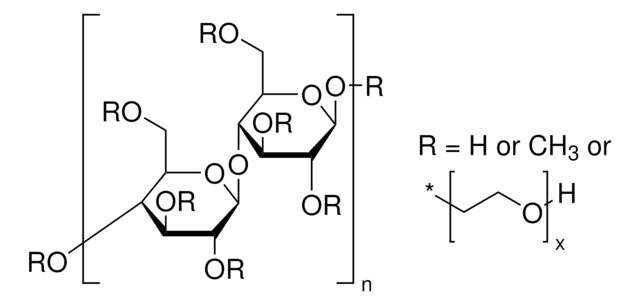Recommended Products
Quality Level
extent of labeling
0.06-0.50 mol hydroxyethyl per mol cellulose (M.S.)
8 wt. % hydroxyethyl
26 wt. % methoxy
1.3-2.2 mol methyl per mol cellulose (D.S.)
surface tension
45-55 dyn/cm, 20 °C, 0.1 wt. %
viscosity
15,000-20,500 cP, 2 wt. % in H2O(20 °C, Brookfield, spindle #6) (20 rpm)(lit.)
transition temp
flocculation range 60-90 °C (0.5 wt. %)
Looking for similar products? Visit Product Comparison Guide
Related Categories
Application
Water retention aid, thickening agent, protective colloid, suspending agent, binder and stabilizer.
Storage Class Code
11 - Combustible Solids
WGK
WGK 1
Flash Point(F)
Not applicable
Flash Point(C)
Not applicable
Personal Protective Equipment
dust mask type N95 (US), Eyeshields, Gloves
Choose from one of the most recent versions:
Already Own This Product?
Find documentation for the products that you have recently purchased in the Document Library.
Customers Also Viewed
Rondedrick Sinville et al.
Electrophoresis, 29(23), 4751-4760 (2008-12-05)
We have developed a new method for the analysis of low abundant point mutations in genomic DNA using a combination of an allele-specific ligase detection reaction (LDR) with free-solution conjugate electrophoresis (FSCE) to generate and analyze the genetic products. FSCE
Su Jeong Ban et al.
Food and chemical toxicology : an international journal published for the British Industrial Biological Research Association, 50(5), 1716-1721 (2012-03-06)
The effect of hydroxyethyl methylcellulose (HEMC) with different viscosities on the glucose metabolism and antioxidative defense system in high fat-fed mice was investigated. The mice were randomly divided into five dietary groups: normal control diet (NC), high fat diet (HF)
Roland Adden et al.
Analytical chemistry, 78(4), 1146-1157 (2006-02-16)
Hydroxyethylmethyl celluloses (HEMC, DS(Me) 1.46-1.66, DS(HE) = 0.14-0.17) have been analyzed with respect to their methyl and hydroxyethyl pattern in the glucosyl units and along the polymer chain. Methyl groups were located by GLC/MS after direct hydrolysis, reduction, and acetylation
Su Jeong Ban et al.
Food and chemical toxicology : an international journal published for the British Industrial Biological Research Association, 50(2), 130-134 (2011-11-01)
The effect of hydroxyethyl methylcellulose (HEMC), in comparison with hydroxypropyl methylcellulose (HPMC), on the body weight and lipid metabolism in mice fed with high fat diet was investigated. The animals were given normal control diet (NC group), high fat diet
M G Lee
Journal of clinical and hospital pharmacy, 7(1), 67-70 (1982-03-01)
A method is reported for the analysis of prostaglandin PGE2 in methylhydroxyethylcellulose gel. Stability studies using the method have shown that the degradation of PGE in the gel is a first order process at 4 degrees and 25 degrees C.
Our team of scientists has experience in all areas of research including Life Science, Material Science, Chemical Synthesis, Chromatography, Analytical and many others.
Contact Technical Service







